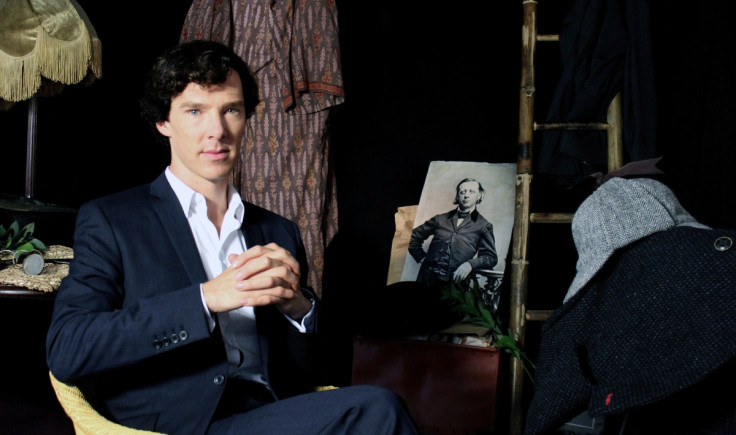Sherlock and the Power of Fan Fiction

"Be careful what you wish for," the saying goes. The hype surrounding the third season of Sherlock was stratospheric after the show's leads Benedict Cumberbatch and Martin Freeman had gone on to conquer Hollywood and eager fans had spent two years puzzling over how the great detective faked his own death and survived that rooftop fall.
So when the drama finally returned, it caught many viewers off guard by just how much writers Mark Gatiss and Steven Moffat not only recognised, but incorporated, the dedicated fanbase into these three new episodes.
Opening episode 'The Empty Hearse' played around with the many theories debated online over how Sherlock survived, as we were given multiple solutions, including the use of Derren Brown and even a slash fiction kiss between Sherlock and Moriarty.
In follow-up episode, 'The Sign of Three', we were treated to a series of flashbacks that charted Sherlock and John's friendship, and in finale 'His Last Vow' we delved into the unexplored territory of Sherlock's troubled childhood.
The emphasis this year has moved away from the simple crime-solving of earlier Sherlock episodes towards character-driven drama, where part of the joy, as evidenced by the drunken deductions sequence in 'The Sign of Three', is in seeing these well-known characters in unfamiliar situations. As Andrew Blair noted in Den of Geek, "In reaching out to fandom, series three has demolished the fourth wall".
Some people have not been too happy that the series has catered to its online fan base over more casual viewers. "While any successful TV drama these days should generate fan fiction, it can not afford to become entirely fan fiction itself," said Mark Lawson in The Guardian.
Archie Bland in The Independent went even further, saying: "The creators have discovered their devoted fans are so expert – and so bankable – that the concerns of the casual viewer can be dispensed with altogether."
It's an interesting point, but fails to recognise the unique position of Sherlock as fan fiction since its inception, as well as how over recent years the boundaries between professional media and fan fiction have become increasingly blurred.
Fan Fiction
Fan fiction is usually described as any form of writing about characters that doesn't stem from the original creator, in which case the two lead writers of Sherlock, Steven Moffat and Mark Gatiss, are more or less paid fan fiction writers. Wanting to move away from the stale reverence that defined previous TV adaptations such as ITV's The Adventure of Sherlock Holmes, the two reinterpreted Arthur Conan Doyle's original stories to make Sherlock a 21<sup>st century sleuth, and their version has always been aware of its characters' mythology.

Playing on story titles, the first Sherlock Holmes story 'A Study in Scarlet', was adapted in the first Sherlock episode to 'A Study in Pink', and each episode is littered with references here or there to the back catalogue of Conan Doyle adventures. It's no surprise then, to see this taken further in 'The Empty Hearse', breaking the fourth wall by incorporating fan theories in to the episode, and ending with the self-conscious Benedict Cumberbatch, dressed in the iconic deerstalker, declaring to Watson, "It's time to be Sherlock Holmes".
The Rise of Nerdywood
This influence of the fan over the material is not just the case with Sherlock, and Steven Moffat's other TV show Doctor Who, but a growing trend where the outside voices have becomes content creators, and have reciprocated in kind to the diehard fan base. Whilst Peter Jackson's The Lord of The Rings was a more or less straightforward adaptation, his Hobbit trilogy has padded out what was a 310 page children's book in to what will be over eight hours of Tolkien fan fiction. JJ Abrams' Star Trek film series is another Hollywood blockbuster that aims to incorporate a new generation of viewers but is still infatuated with its TV show past, including Leonard Nimoy as an older Spock and Benedict Cumberbatch as infamous enemy Khan.
But perhaps the greatest example of fan fiction at work is in the Marvel Cinematic Universe. With the most popular superhero movies, from Batman to Spider-Man, already adapted for the screen, Marvel ambitiously began bringing out movie versions of their lesser known characters, such as Iron Man and Thor, but having them exist in a shared reality that mirrors the Marvel Universe of the comics.
The superheroes were united by Buffy the Vampire Slayer creator Joss Whedon, himself a deity among science fiction and fantasy fans, for what was essentially a fan fiction movie in The Avengers.
The fact that it went on to accrue the biggest box office of 2012, grossing over $1bn worldwide, shows just how profitable it has become to provide content that caters towards diehard fans over a general audience.
With a JJ Abrams trilogy of new Star War films on the way, the domination of Nerdywood is not set to end any time soon.
In the digital age we have all become more interactive with the media we consume, discussing, debating, interpreting and remixing films and television be it via tweets or Tumblr gifs.
From its many loving references to the novels, to its recognition of its online fan base, Sherlock is the logical extreme of the trans-media osmosis that is occurring, whereby our favourite programmes exist outside the screen amongst fans, whilst in turn their discussions filter back in to the content they watch.
© Copyright IBTimes 2025. All rights reserved.






















